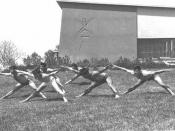National Curriculum
Part 1 - Introduction
Education is the basis of becoming successful either in the work place or college; it is valuable and important in our society. The National Curriculum was introduced in 1988 into schools of England and Wales to ensure that all children in schools receive the same basic education. Students are taught skills, understanding, and knowledge to enter college and become successful in life. Students are usually taught the same basic subjects in schools such as English, Math, Science, Geography, History, and Physical Education until they enter college, but they are taught differently and in different levels. By using the National Curriculum, the students should be able to develop literacy and numeracy skills, extend their creativity, and improve the standard of their work. As David Coulby states in his book, Beyond the National Curriculum Curricular Centralism and Cultural Diversity in Europe and the USA, "This is a central area of educational debate in England and Wales.
Increasingly politicians and their entourages are looking for quick fixes from abroad to solve what they see to be problems in the educational system of the UK."(57)
Part 2 - Background
Before the 1988 Education Reform Act, schools throughout England and Wales were free to decide the content of their curriculum. The National Curriculum was designed to take children through their school life from the ages of 5 to 16. As it was stated on University of Derby website, "The 1988 Education Reform Act set in motion the most far reaching reform in British education since the 1940s. The establishment of a basic prescribed curriculum, by right, entitled the National Curriculum" (University of Derby). National Curriculum sets out what children should know and be able to do at certain stages during their education. The National Curriculum is split...


